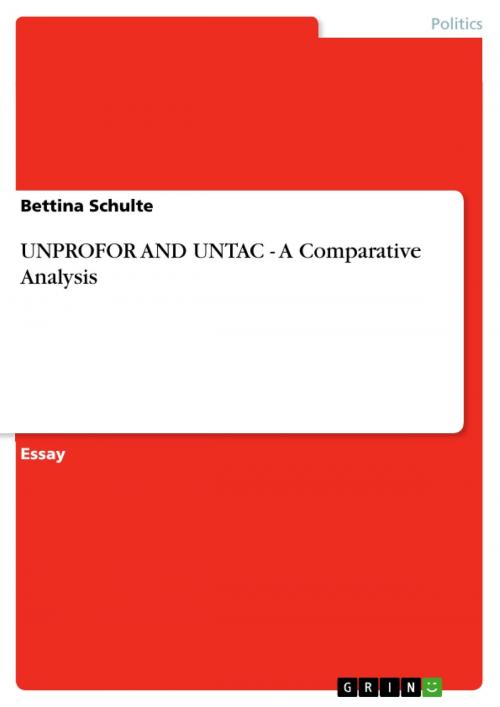UNPROFOR AND UNTAC - A Comparative Analysis
A Comparative Analysis
Nonfiction, Social & Cultural Studies, Political Science, International, Foreign Legal Systems| Author: | Bettina Schulte | ISBN: | 9783638564939 |
| Publisher: | GRIN Publishing | Publication: | November 3, 2006 |
| Imprint: | GRIN Publishing | Language: | English |
| Author: | Bettina Schulte |
| ISBN: | 9783638564939 |
| Publisher: | GRIN Publishing |
| Publication: | November 3, 2006 |
| Imprint: | GRIN Publishing |
| Language: | English |
Essay from the year 2005 in the subject Politics - Political Systems - General and Comparisons, grade: 2,0, Bilkent University , course: Peacekeeping Operations, 20 entries in the bibliography, language: English, abstract: The war in Bosnia, and in particular the failure of the international community to put an end to it for 3 long years, has represented a tough anticlimax for the post-Cold War euphoria, envisaging a smooth and peaceful transition towards a functioning collective security system. The gap between ends and means or expectations and capabilities were so wide that the international community undermined the possibility of successful intervention. UNPROFOR was initially deployed in Croatia, with headquarters in Sarajevo which at the time, early 1992, was before the recognition of its independence. Subsequently, with the escalation of the civil war in Bosnia, it's mandate extended to Bosnia and as preventative deployment to the FYROM. In addition, UNPROFOR had an operational mandate in Serbia and Montenegro and a liaison presence in Slovenia.1The purpose of this essay is to discuss UN peace keeping operations, specifically, it shall examine the case of UNPROFOR. It shall aim to provide valuable knowledge on the creation of the force, the functions of the force, organization of the force, financing of the force and a final evaluation of the force. In order to succeed in this analytical framework it is adherent to have a background knowledge on the nature of the conflict and how is transformed.
Essay from the year 2005 in the subject Politics - Political Systems - General and Comparisons, grade: 2,0, Bilkent University , course: Peacekeeping Operations, 20 entries in the bibliography, language: English, abstract: The war in Bosnia, and in particular the failure of the international community to put an end to it for 3 long years, has represented a tough anticlimax for the post-Cold War euphoria, envisaging a smooth and peaceful transition towards a functioning collective security system. The gap between ends and means or expectations and capabilities were so wide that the international community undermined the possibility of successful intervention. UNPROFOR was initially deployed in Croatia, with headquarters in Sarajevo which at the time, early 1992, was before the recognition of its independence. Subsequently, with the escalation of the civil war in Bosnia, it's mandate extended to Bosnia and as preventative deployment to the FYROM. In addition, UNPROFOR had an operational mandate in Serbia and Montenegro and a liaison presence in Slovenia.1The purpose of this essay is to discuss UN peace keeping operations, specifically, it shall examine the case of UNPROFOR. It shall aim to provide valuable knowledge on the creation of the force, the functions of the force, organization of the force, financing of the force and a final evaluation of the force. In order to succeed in this analytical framework it is adherent to have a background knowledge on the nature of the conflict and how is transformed.















